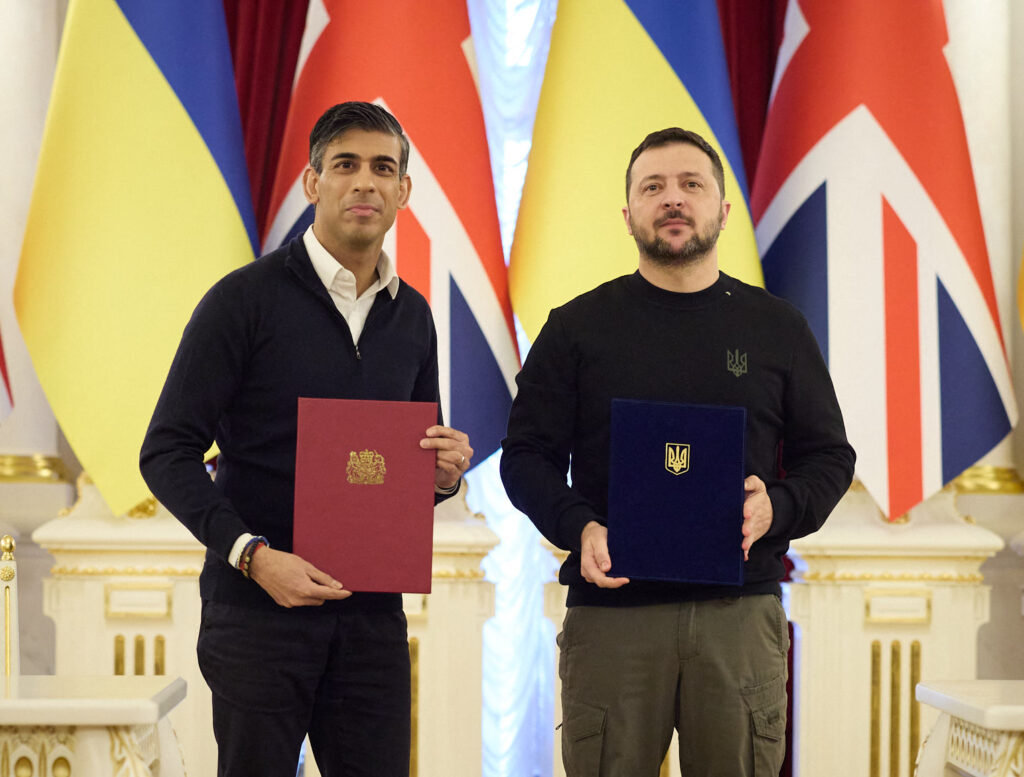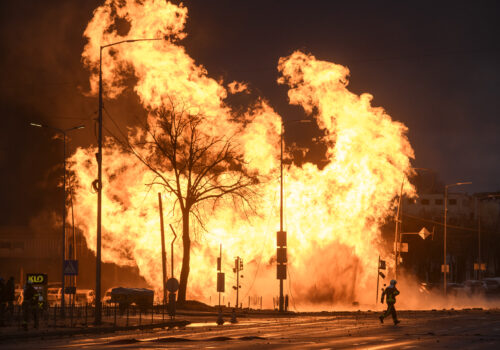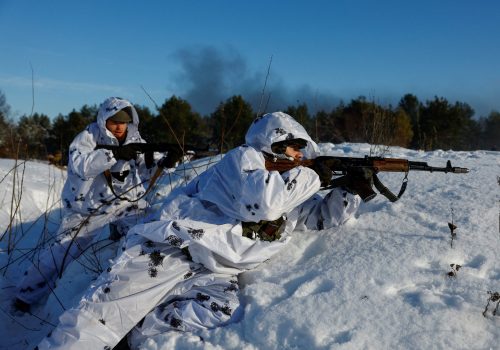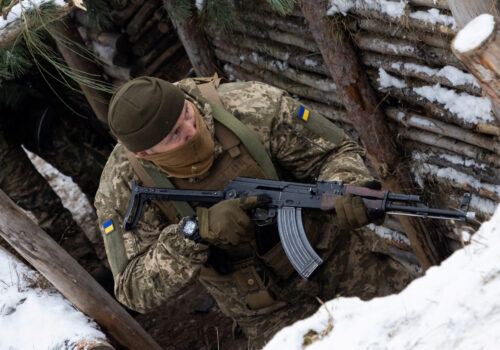Amid mounting concern over the future of US military aid, European nations are increasing their support for Ukraine. With a major new American aid package currently stuck in Congress, there is an emerging consensus among European leaders that it is unwise to rely on the United States to defend them against Russia. Instead, they appear to recognize that Europe must be able to meet its own security needs, and are mobilizing to provide Ukraine with the backing necessary to prevent a Russian victory that would have disastrous consequences for the entire continent.
This shift in emphasis across the Atlantic was already becoming evident in the second half of 2023. According the German-based Kiel Institute’s Ukraine aid tracker, Europe collectively overtook the United States in September 2023 in terms of financial, military, and humanitarian aid for Ukraine. Subsequent delays toward the end of 2023 in Washington DC and to the EU’s own multi-year aid package have convinced a number of European countries to further boost their support.
Stay updated
As the world watches the Russian invasion of Ukraine unfold, UkraineAlert delivers the best Atlantic Council expert insight and analysis on Ukraine twice a week directly to your inbox.
In the final weeks of 2023, Britain and France jointly reaffirmed their determination to make sure Russia’s invasion ends in failure, while calling on the West to leverage its economic might in order to overtake Russia’s own shift to a wartime economy. British Foreign Secretary David Cameron pointed out that the economies of Ukraine’s Western allies are 25 times larger than Russia’s. “What we have to do is make that economic strength pay,” he commented. “I have no doubt we can make sure Putin loses, and it’s essential that he does lose.”
The UK further underlined its support for Ukraine when British Prime Minister Rishi Sunak visited Kyiv in January to confirm a record annual support package of over $3 billion and to sign a landmark bilateral security pact. Meanwhile, French President Emmanuel Macron has recently confirmed France will deliver military aid to Ukraine in 2024 including 40 long range Scalp cruise missiles and several hundred bombs. He plans to visit Kyiv in February, and is expected to sign a security agreement similar to the recently inked accord between Britain and Ukraine. France is also ramping up weapons production to keep pace with Ukraine’s requirements.
In early January, German Chancellor Olaf Scholz announced plans to double military aid to Ukraine in 2024 while urging fellow EU member states to do likewise. “I call on our allies in the European Union to also step up their efforts in support of Ukraine. The arms deliveries for Ukraine planned so far by the majority of EU member states are by all means too small,” he commented. “We need higher contributions.”
Eurasia Center events

In 2023, the Baltic states and Norway led the pack in proportional terms with military and humanitarian aid donations to Ukraine amounting to more than 1.6 percent of their GDPs, according to Kiel Institute figures. A number of European countries are set provide Ukraine with vital fighter jets in 2024 and beyond. The Netherlands and Denmark are expected to supply Ukraine with up to 61 F-16 fighter jets, with Belgium on track to deliver over 50 jets as new replacement models arrive. Norway has agreed to hand over ten F-16s equipped with anti-ship missiles.
Ukraine’s fellow Black Sea nations are also increasing their engagement. In early 2024, Romania, Bulgaria, and Turkey signed off on a new trilateral initiative to improve maritime safety in the Black Sea and help Ukraine keep shipping lanes open by clearing Russian mines. The move comes after Ukraine broke the Russian naval blockade of the country’s Black Sea ports and in the second half of 2023 and established a new corridor for merchant shipping.
In Brussels, efforts continue to overcome obstacles created by Hungary, which used its veto to block a landmark EU aid package for Ukraine in December 2023. Members of the European Parliament are initiating efforts to strip Budapest of its veto powers to prevent the country from holding the rest of the EU to ransom. “The EU will approve Ukraine aid with or without Hungary,” pledged European Commission President Ursula von der Leyen on January 16 at the World Economic Forum in Davos.
Europe’s growing support for Ukraine comes as the full-scale Russian invasion of the country approaches the two-year mark with no end in sight. European leaders increasingly appreciate that their own security is at stake in Ukraine, and understand that if Putin’s invasion ends in victory, their own countries will be directly at risk. The military threat posed by a resurgent Russia has clearly focused European attention, as have recent delays in US aid. There is now a realization across the continent that Putin is a European problem, and it is primarily up to Europe to stop him.
Diane Francis is a nonresident senior fellow at the Atlantic Council’s Eurasia Center, editor-at-large with the National Post in Canada, author of ten books, and author of a newsletter on America.
Further reading
The views expressed in UkraineAlert are solely those of the authors and do not necessarily reflect the views of the Atlantic Council, its staff, or its supporters.

The Eurasia Center’s mission is to enhance transatlantic cooperation in promoting stability, democratic values and prosperity in Eurasia, from Eastern Europe and Turkey in the West to the Caucasus, Russia and Central Asia in the East.
Follow us on social media
and support our work
Image: Ukrainian President Volodymyr Zelenskyy welcomes British PM Rishi Sunak to Kyiv, Ukraine, on Friday, January 12, 2024. Sunak was in the Ukrainian capital to sign the Agreement on Security Co-operation between Ukraine and the United Kingdom, the first bilateral agreement within the framework of the Joint Declaration of Support for Ukraine adopted in Vilnius in July 2023 by the G7 countries. The two leaders also visited military personnel undergoing treatment for wounds sustained in combat against Russia. (Photo by Ukrainian Presidency via ABACAPRESS.COM)




